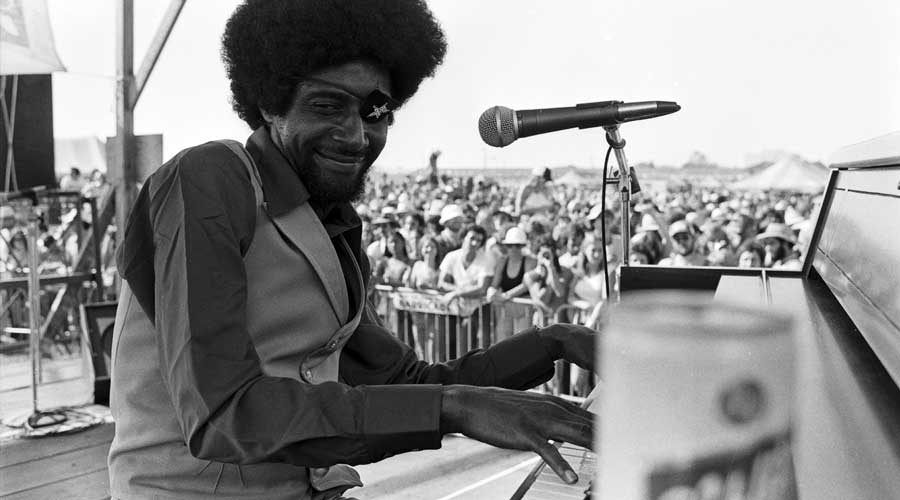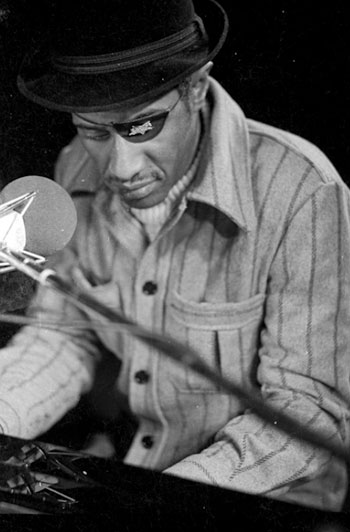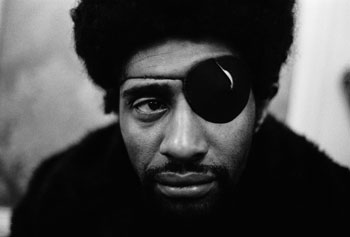BAYOU MAHARAJAH

Image Credit: Historic New Orleans Collection
Release Date: 2013
by Chris Morris (July 17, 2013)
If you weren’t looking for it, it was easy to miss the L.A. premiere of Bayou Maharajah, Lily Keber’s magnificent new documentary about the New Orleans singer-pianist James Booker. It was scheduled for a 5 p.m. Tuesday screening at Outfest, the local LGBT film festival. At this point, it may be the only screening the picture will receive locally for some time: It still has not secured theatrical distribution, possibly because of clearance issues relating to the voluminous amount of music, almost all of it splendid, in the film. But it may show up at a film festival in your neck of the woods.
It was odd to see the feature in the context of a gay film fest, since Booker’s homosexuality is treated so matter-of-factly that it’s one of the lesser narrative threads in the film. (Another reason it plays in the background, Keber suggested in a post-screening chat at the DGA 2 Theater, may be the reluctance of those who knew Booker, whether intimately or casually, to discuss his sexuality on camera.) But even the most radically sensational aspects of his life – his alcoholism, his addiction to heroin and cocaine – get measured treatment. One violent piece of Booker’s legend – the loss of his left eye – receives widely divergent retelling from a host of witnesses, none of whom appears to have the real story. Every element of what could have been a luridly told tale is recounted even-handedly, with the heat turned down low.

The focus of Bayou Maharajah, as it should be, is on Booker’s extraordinary music. He was a pure product of New Orleans, where he was born in 1939 and died, at the age of 43, in 1983. He stands in a line of Crescent City piano wizards that includes Edward Frank, Tuts Washington, Archibald, Professor Longhair, and Fats Domino, to name just a few. Jelly Roll Morton was clearly a model of sorts. But Booker’s style, though rooted in New Orleans jazz and R&B, was sui generis. Perhaps that is why he still remains one of the city’s least-known giants. The fact that he cut just two studio albums in his own right during his lifetime – Junco Partner (1976) and Classified (1982) – may have something more to do with his comparative obscurity.
It’s a pity, for Booker is beyond compare. Reared in a family of Baptist ministers, he learned piano and organ (and saxophone as well) as a child, and showed prodigious skill on the keyboards. He was as at home with the classics as he was with the funk. He was just 14 when he recorded his first hit, “Doin’ the Hambone,” for Imperial Records. A No. 3 R&B hit, “Gonzo,” followed in 1960; its title inspired the handle for Hunter S. Thompson’s school of unbridled journalism. Booker became a preferred New Orleans sideman, playing with just about every bandleader of note. But his own preferences turned to hard drugs, and he wound up, in his words, “partying on the Ponderosa” – doing a stint at Louisiana’s notorious Angola prison farm, where bluesmen Lead Belly and Robert Pete Williams also did time.
Booker had opportunities to record – the master tapes of a 1973 album cut with Dr. John’s band disappeared after he absconded with them for “safe keeping” – but he found his greatest success as a performer on the European festival circuit. Bayou Maharajah reaches the height of intensity with a performance drawn from Booker’s 1978 appearance at Switzerland’s Montreux Jazz Festival, a rendition of R&B pianist Lloyd Glenn’s “True.”
Keber lets the song run for most of its seven-minute length, making one small and imperceptible edit. I’ve long found this performance to be among the really great achievements in any genre. Everything that is astonishing about Booker is audible there. It’s a combination of taut, profoundly felt singing and dizzying piano improvisation. But Booker’s keyboard work is never merely ornamental. It arcs over itself in a kind of instrumental embellishment of the pain one hears in Booker’s vocal. I’ve watched the complete “True” dozens of times on YouTube, and it seldom fails to bring me to tears. At the DGA screening, some of the audience broke out in applause.
After his Montreux moment, it was almost all downhill for Booker. He returned to New Orleans from Europe and found that he couldn’t get a gig. Maple Leaf Bar owner John Parsons provided him with about the only steady work he would get for the remainder of his life. For a time, he took a job for the city of New Orleans, sitting at a desk behind a computer in a municipal finance department. A year after his last 1982 recording session (with producer Scott Billington, for Classified), he died, unattended, sitting in a wheelchair in a hallway of Charity Hospital. Though his death was reputedly the result of cocaine abuse, the truth is likely that his body just gave out after years of hard living.

Bayou Maharajah could easily have focused on the most sordid aspects of Booker’s life. While there is no shortage of mind-boggling detail, first-time filmmaker Keber never leans on it for effect. The movie is emphatically about Booker’s music, and you get to hear plenty of it.
Most of the interview subjects in the film – most notably Harry Connick, Jr., whose father, for a time New Orleans’ district attorney, was exceptionally tight with the musician – are plainly in awe of his work. At one juncture, Connick sits at a piano and picks apart Booker’s style, a flexible, wholly original amalgam of classical, R&B, and jazz. But the music resists analysis in the end, and you sit almost stupefied by its brilliance. One winds up swept away by the wildness of its flights – no place more so than in a sequence near the end of the film, in which a long, frenetic Booker arabesque is set against sped-up black-and-white footage of Crescent City barrooms at night. (This material and other vintage home movie footage beautifully evoke the city in Booker’s heyday of the ‘70s and ‘80s.)
In all, it’s a beautiful picture, and you should – must, actually – keep your eyes open for it. Bayou Maharajah is subtitled The Tragic Genius of James Booker, but the film never wallows in its hero’s dark fate. It’s a very poised piece of moviemaking that declines to sink to the maudlin, and instead invites viewers to revel in the unique genius of its subject, who deserves a seat high in the pantheon of New Orleans’ greats. Even in that crowded field, Booker stands by himself.
Cast & CreditsDirected by Lily Keber
Joe Boyd
Douglas Brinkley
Harry Connick Jr.
Dr. John
Hugh Laurie
Ronald Markham
Cosimo Matassa
Bunny Matthews
Tom McDermott
Charles Neville
Antonino Paone
Bruce Boyd Raeburn
Reggie Scanlan
Irma Thomas
Allen Toussaint
George Winston

